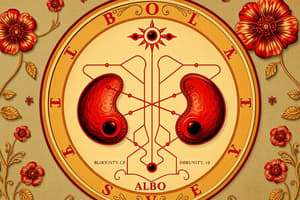Podcast
Questions and Answers
Individuals with which blood type can donate to all other blood types?
Individuals with which blood type can donate to all other blood types?
- Type AB
- Type O (correct)
- Type B
- Type A
What is the significance of the Rh factor in the blood typing system?
What is the significance of the Rh factor in the blood typing system?
- It is used to classify rare blood types like Bombay
- It determines the presence of A and B antigens
- It denotes the presence or absence of a specific antigen (correct)
- It indicates whether a person has antibodies or not
Which blood type contains both A and B antigens but no antibodies?
Which blood type contains both A and B antigens but no antibodies?
- Type AB (correct)
- Type O
- Type B
- Type A
Which statement about the Bombay blood type is true?
Which statement about the Bombay blood type is true?
What is the primary reason for understanding blood types in medicine?
What is the primary reason for understanding blood types in medicine?
Which blood type is associated with an increased susceptibility to malaria?
Which blood type is associated with an increased susceptibility to malaria?
What is the primary function of blood in the human body?
What is the primary function of blood in the human body?
Which of the following is not one of the four main blood groups in the ABO system?
Which of the following is not one of the four main blood groups in the ABO system?
Individuals with type A blood have which of the following in their plasma?
Individuals with type A blood have which of the following in their plasma?
Which blood type can receive blood from any other blood type?
Which blood type can receive blood from any other blood type?
Which blood type can donate blood to all other blood types?
Which blood type can donate blood to all other blood types?
What is the significance of understanding one's blood type?
What is the significance of understanding one's blood type?
Study Notes
Blood Types
Blood is one of the vital components of human life. It performs various functions such as transporting oxygen, nutrients, and waste products throughout the body. Moreover, it helps in clotting during injuries. Understanding our blood type can have significant implications for medical treatments, transfusions, and even personal habits like diet. In this article, we will dive deeper into the concept of blood types and their importance.

ABO System
The most common system used to classify blood types involves the ABO system. This system categorizes blood based on the presence or absence of two antigens — A and B — and antibodies against them. There are four main groups in the ABO system: A, B, AB, and O. If you inherit a gene from your mother and father encoding these proteins, you have either type A or type B blood; if neither parent has these genes, you may be type O.
Type A
Type A blood contains both A antigen and anti-B antibody. This means that individuals with type A blood cannot receive blood from individuals with type B or AB blood due to the presence of anti-B antibody in their plasma. Similarly, individuals with type A blood can donate to all other blood types except type B and AB.
Type B
Type B blood contains both B antigen and anti-A antibody. Individuals with type B blood can receive blood from any group except type A and have the ability to donate to all groups.
Type AB
Individuals with type AB blood possess both type A and B antigens, but no corresponding antibodies. This makes them "universal recipients," as they can receive blood from all four groups. However, due to their unique combination of antigens, those with type AB blood may only give blood to others with the same type.
Type O
Type O blood lacks both A and B antigens, while having anti-A and anti-B antibodies present. People with type O blood can donate to anyone regardless of their blood type, making them "universal donors." They cannot receive blood from people with type A or B blood, unless it has been specially treated.
Rh System
The second system used to classify blood is the Rh system. This system involves the presence or absence of an antigen called the Rh factor. If an individual has the Rh factor, their blood type will be listed as 'Rh positive'; if they do not have the Rh factor, their blood type will be listed as 'Rh negative'.
Other Blood Types
There are additional rare blood types that fall outside the main ABO and Rh systems. Some examples include Bombay blood type, which is neither A nor B and does not produce any anti-A and anti-B antibodies; and the Diego blood group, which is associated with increased susceptibility to malaria.
Understanding blood types is crucial in various aspects of medicine, such as determining compatibility during organ transplants and blood donation. Being aware of your own blood type can also help guide personal decisions related to diet and supplements. As always, ensuring proper medical guidance and care remains vital when dealing with these matters.
Studying That Suits You
Use AI to generate personalized quizzes and flashcards to suit your learning preferences.
Description
Test your knowledge about blood types and compatibility with this quiz. Explore the ABO system, Rh system, and other rare blood types that play a crucial role in medical treatments and transfusions.




